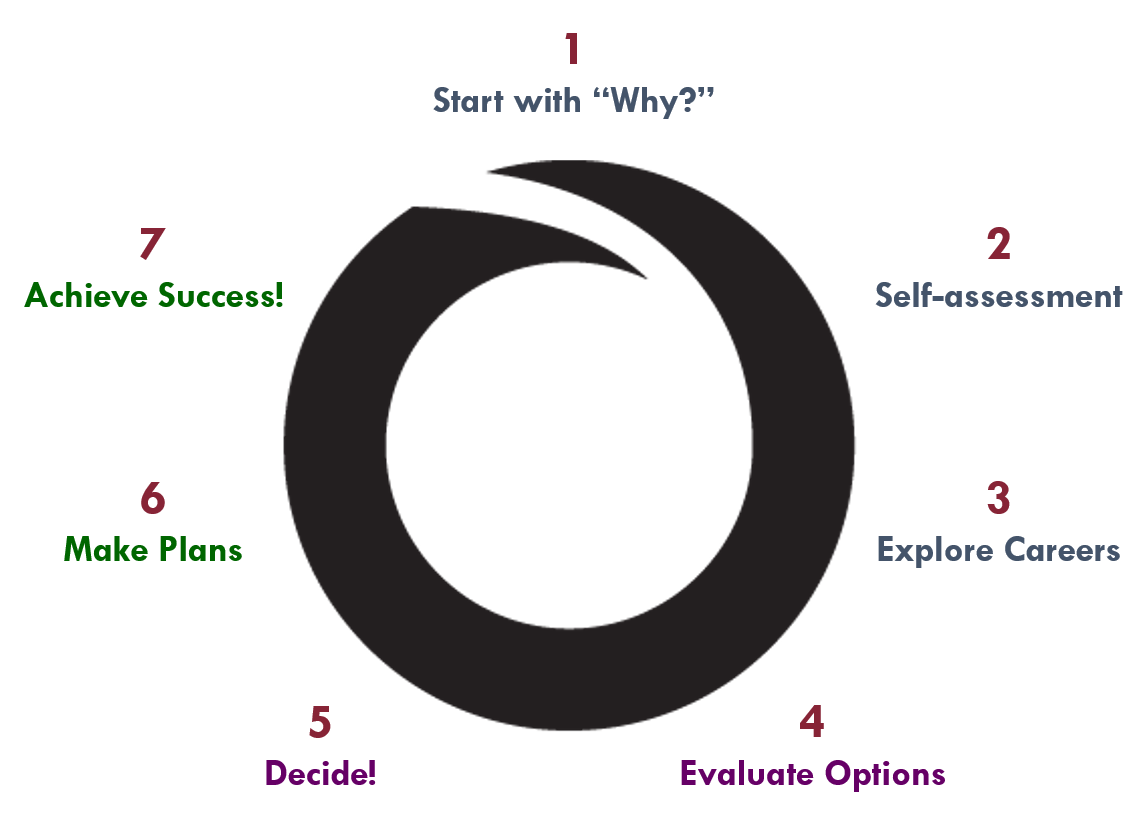Career Decision Making
Deciding on a career is one of the biggest decisions you'll ever make and we're here to help! The Norco College Career Center provides a variety of resources to guide and direct you through a proven career development process. See below for a brief description of the steps to this process and make an appointment with one of our counselors today for career planning assistance.

READY…
1) Start with "Why?": The first step in the career development process is to learn about how good decisions are made, acknowledge all of the external factors that influence your decisions, and assess the core values in your life that define what you would consider to be a satisfying career. The past experiences and future goals that drive you to succeed are what we call your "why" - your reasons for starting your educational journey and seeing it through to completion.
2) Self-Assessment: Once you have a confident understanding of your life goals (Step 1), it's time to assess your skills (what you are good at), interests (what you enjoy doing), and abilities (what you can achieve given realistic constraints). Visit our Career Assessment page for access instructions. We recommend starting with the MicroSkills assessment at www.eureka.org (site ID: IUJRUYV). This information should be reviewed and interpreted by a professional who can help you synthesize these factors and explain how to use this information as you set your career goals.
3) Explore Careers: At this step of the process you will begin to research and identify potential career options that align with your skills, interests, and abilities, while also fulfilling your values. Resources abound that provide career exploration data such as www.onetonline.org or www.eureka.org (site ID: IUJRUYV). You should learn about various job titles within career fields and consider information regarding pay, job growth projections, and the educational preparation needed to enter the field. You will find that there are many good career options available, so make a list of up to seven (7) careers that you would like to analyze further in Step 4.
SET…
4) Evaluate Options: This is a critical step of the process where you will compare and contrast each career. The analysis should focus more on how the careers align with your values (from Step 1) than how they compare to one another, but considering them as a group will make it easier to decide which is the best option for this time of your life.
5) Decide!: Time to decide on a career goal! This is the part of the career development process where you select the best career option currently available and declare your career goal. We recommend setting a career goal using the SMART goal setting framework to make sure your goal is Specific, Measurable, Attainable, Relevant, and Time bound.
CAREER!
6) Make Plans: Once you decide on the end goal, it is time to make some plans. Students are encouraged to meet with a counselor to create an education plan, but to also seek assistance with building plans for career/professional development and financial support. Job postings are a great place to find out what employers are currently requiring as experience and education for various positions, and you can use www.linkedin.com to review the profiles of current professionals and take note of their paths to success.
7) Achieve Success!: Reach your goal by utilizing college resources offered to ensure your post-completion success! The Career Center offers employment services to help you prepare an effective resume, practice job interview skills, build a professional network, and more! The Transfer Center offers support to help you transfer to CSUs, UCs, out-of-state, and private universities.
The Gap: The image used to represent our career development process is a circle with an opening after Step 7 and before Step 1. This “gap" serves as a reminder for the inevitability of life transitions. Even after making a firm career decision and achieving your career goals, life events will eventually occur that affect your values. This may include activities like starting a family, getting a new job, completing high school or college, becoming ill or disabled, or even entering retirement. As these life events change what you consider to be most important, your career path will need to be re-evaluated to determine if it still fulfills your values. If so, that's great, and you should probably continue in the same career path, but if not, then we encourage you to take time to go through the career development process again starting at Step 1 to help you successfully identify new opportunities and decide which path is best for your future. Remember, most people change their career focus three or more times throughout their lifetime, so the key is to make the best career decisions you can today based on your current values and be ready to adapt and remain resilient as life events come your way.